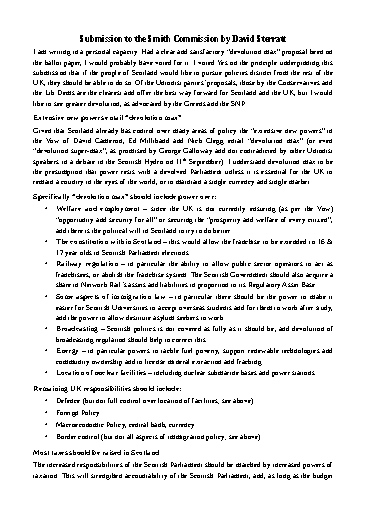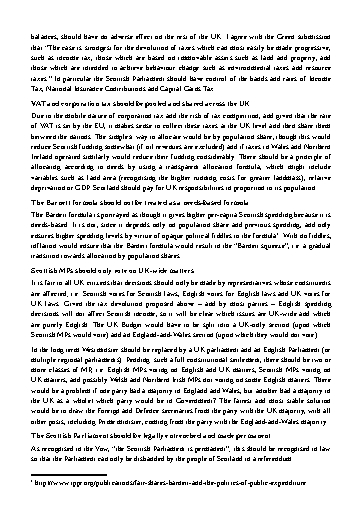
Following September’s Referendum on Scottish independence, the Prime Minister tasked Lord Smith of Kelvin with convening ‘cross-party talks and facilitat[ing] an inclusive engagement process across Scotland to produce, by 30 November 2014, Heads of Agreement with recommendations for further devolution of powers to the Scottish Parliament’.
Two representatives from each of the parties represented at Holyrood were nominated to the Commission (including Leith Walk ward’s Green councillor Maggie Chapman). But submissions were also invited from members of the public by 31 October.
Some 250 contributions from groups were subsequently received, and around 14,000 letters or emails from individuals.
Among the latter was one from local resident David Sterratt, produced according to the Commission’s guidelines which asked, for example: ‘What are the principles underpinning your proposals? [...] We are keen to avoid a simple “shopping list” of further powers’. They also requested respondents to consider the ‘practical difficulties in any proposals and how they might be overcome’.
We reproduce Sterratt's response below, unedited except for the style of a footnote, in as close an approximation of the original as we can manage on this website.
His views do not represent the settled will of the Broughton Spurtle team (there is no such thing on this topic), but is we think an interesting, articulate, fair-minded and concise consideration of weighty issues. If you have reactions to it, or are prepared to share a Smith submission of your own, we’d be delighted to publish them.
You can reach us at at spurtle@hotmail.co.uk and @theSpurtle and Facebook


-----------------
Submission to the Smith Commission by David Sterratt
I am writing in a personal capacity. Had a clear and satisfactory “devolution max” proposal been on the ballot paper, I would probably have voted for it. I voted Yes on the principle underpinning this submission that if the people of Scotland would like to pursue policies distinct from the rest of the UK, they should be able to do so. Of the Unionist parties’ proposals, those by the Conservatives and the Lib Dems are the clearest and offer the best way forward for Scotland and the UK, but I would like to see greater devolution, as advocated by the Greens and the SNP.
Extensive new powers entail “devolution max”
Given that Scotland already has control over many areas of policy the “extensive new powers” in the Vow of David Cameron, Ed Milliband and Nick Clegg entail “devolution max” (or even “devolution super-max”, as promised by George Galloway and not contradicted by other Unionist speakers in a debate in the Scottish Hydro on 11th September). I understand devolution max to be the presumption that power rests with a devolved Parliament unless it is essential for the UK to remain a country in the eyes of the world, or to maintain a single currency and single market.
Specifically “devolution max” should include power over:
• Welfare and employment – since the UK is not currently ensuring (as per the Vow) “opportunity and security for all” or securing the “prosperity and welfare of every citizen”, and there is the political will in Scotland to try to do better.
• The constitution within Scotland – this would allow the franchise to be extended to 16 & 17 year olds in Scottish Parliament elections.
• Railway regulation – in particular the ability to allow public sector operators to act as franchisees, or abolish the franchise system. The Scottish Government should also acquire a share in Network Rail’s assets and liabilities in proportion to its Regulatory Asset Base.
• Some aspects of immigration law – in particular there should be the power to make it easier for Scottish Universities to accept overseas students and for them to work after study, and the power to allow destitute asylum seekers to work.
• Broadcasting – Scottish politics is not covered as fully as it should be, and devolution of broadcasting regulation should help to correct this.
• Energy – in particular powers to tackle fuel poverty, support renewable technologies and community ownership and to license mineral extraction and fracking.
• Location of nuclear facilities – including nuclear submarine bases and power stations.
Remaining UK responsibilities should include:
• Defence (but not full control over location of facilities; see above)
• Foreign Policy
• Macroeconomic Policy, central bank, currency
• Border control (but not all aspects of immigration policy; see above)
Most taxes should be raised in Scotland
The increased responsibilities of the Scottish Parliament should be matched by increased powers of taxation. This will strengthen accountability of the Scottish Parliament, and, as long as the budget balances, should have no adverse effect on the rest of the UK. I agree with the Green submission that “The case is strongest for the devolution of taxes which can most easily be made progressive, such as income tax, those which are based on immovable assets such as land and property, and those which are intended to achieve behaviour change such as environmental taxes and resource taxes.” In particular the Scottish Parliament should have control of the bands and rates of Income Tax, National Insurance Contributions and Capital Gains Tax.
VAT and corporation tax should be pooled and shared across the UK
Due to the mobile nature of corporation tax and the risk of tax competition, and given that the rate of VAT is set by the EU, it makes sense to collect these taxes at the UK level and then share them between the nations. The simplest way to allocate would be by population share, though this would reduce Scottish funding somewhat (if oil revenues are excluded) and if taxes in Wales and Northern Ireland operated similarly would reduce their funding considerably. There should be a principle of allocating according to needs by using a transparent allocation formula, which might include variables such as land area (recognising the higher running costs for greater landmass), relative deprivation or GDP. Scotland should pay for UK responsibilities in proportion to its population.
The Barnett formula should not be treated as a needs-based formula
The Barnett formula is portrayed as though it gives higher per-capita Scottish spending because it is needs-based. It is not, since it depends only on population share and previous spending, and only ensures higher spending levels by virtue of opaque political fiddles to the formula.1 With no fiddles, inflation would ensure that the Barnett formula would result in the “Barnett squeeze”, i.e. a gradual transition towards allocation by population shares.
Scottish MPs should only vote on UK-wide matters
It is fair to all UK citizens that decisions should only be made by representatives whose constituents are affected; i.e. Scottish votes for Scottish laws, English votes for English laws and UK votes for UK laws. Given the tax devolution proposed above – and by most parties – English spending decisions will not affect Scottish income, so it will be clear which issues are UK-wide and which are purely English. The UK Budget would have to be split into a UK-only section (upon whichThe UK Budget would have to be split into a UK-only section (upon which Scottish MPs would vote) and an England-and-Wales section (upon which they would not vote).
In the long term Westminster should be replaced by a UK parliament and an English Parliament (or multiple regional parliaments). Pending such a full constitutional settlement, there should be two or more classes of MP, i.e. English MPs voting on English and UK matters, Scottish MPs voting on UK matters, and possibly Welsh and Northern Irish MPs not voting on some English matters. There would be a problem if one party had a majority in England and Wales, but another had a majority in the UK as a whole: which party would be in Government? The fairest and most stable solution would be to draw the Foreign and Defence secretaries from the party with the UK majority, with all other posts, including Prime minister, coming from the party with the England-and-Wales majority.
The Scottish Parliament should be legally entrenched and made permanent
As recognised in the Vow, “the Scottish Parliament is permanent”; this should be recognised in law so that the Parliament can only be disbanded by the people of Scotland in a referendum.
___________________
1 http://www.ippr.org/publications/fair-shares-barnett-and-the-politics-o…
----------------------------------
ETS adds: If you are interested in the article above, you may be interested in attending this event: Learning about citizen led constitution making, 9 December 2014, University of Edinburgh. Organised by the Academy of Government and the Electoral Reform Society Scotland.